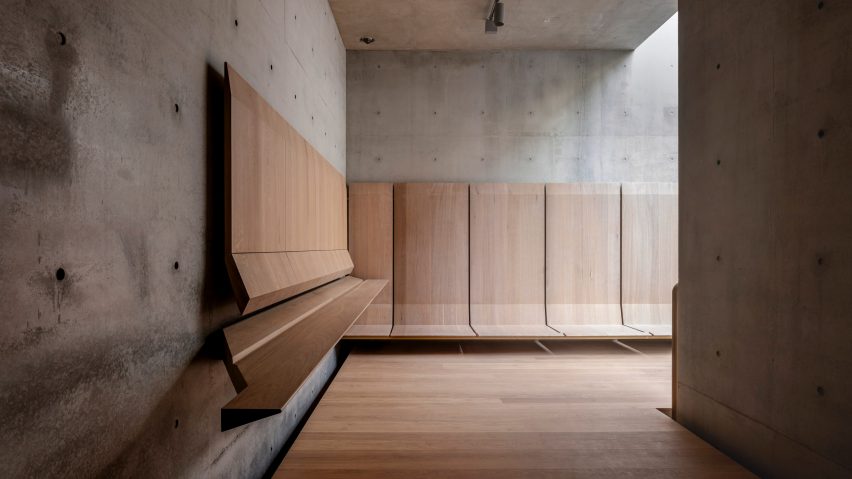
Durbach Block Jaggers and John Wardle Architects create brick-clad cultural centre in Sydney
Phoenix Central Park is a gallery and a performance space in Sydney designed by Durbach Block Jaggers and John Wardle Architects.
The performance space, which was designed by architecture studio Durbach Block Jaggers, is shaped like a bell with stepped walls formed by curving horizontal timber louvres.
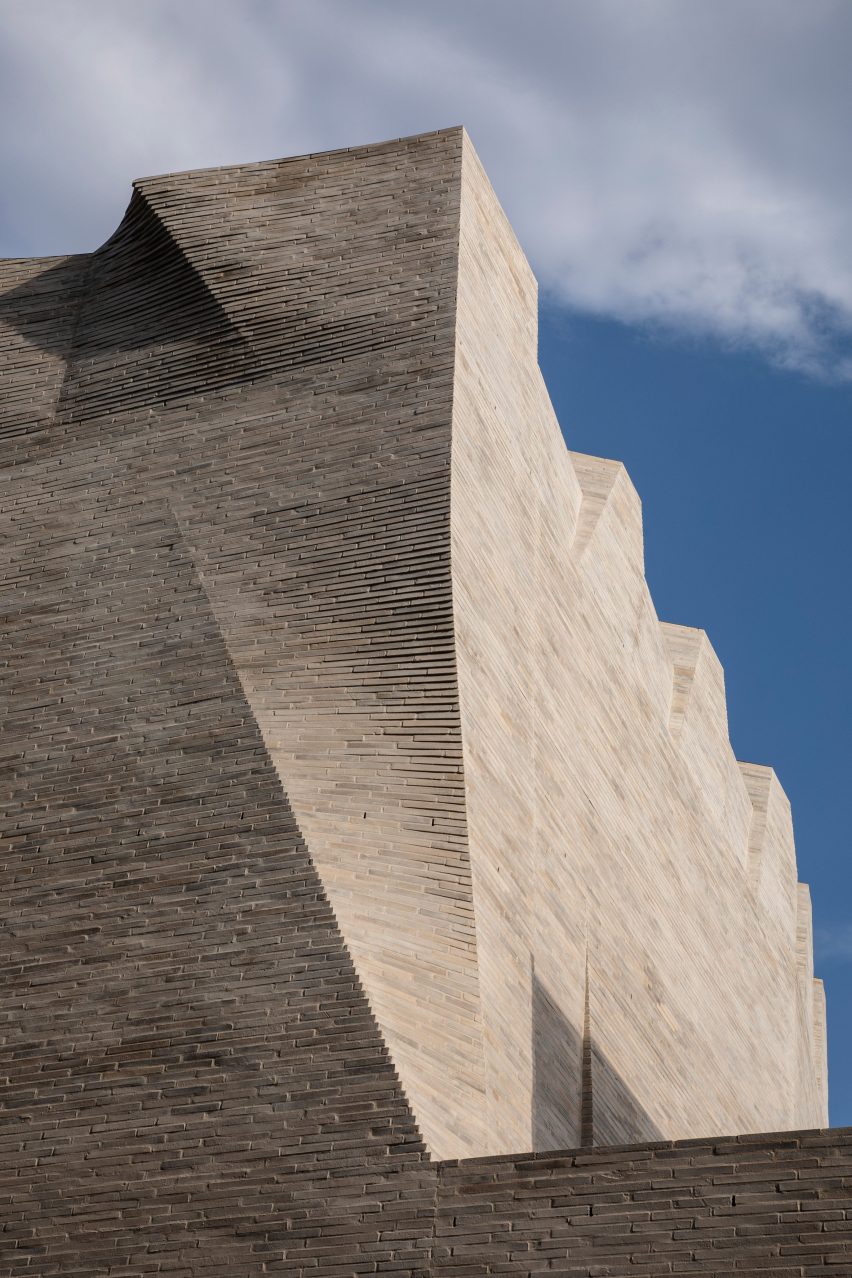
Connected to the auditirium is a gallery space designed by John Wardle Architects as a stack of irregular boxes formed from concrete that has been left bare as a backdrop for the artworks.
Both studios collaborated to create the alternately jagged and undulating facade of long pale-brick facades that enclose the building.
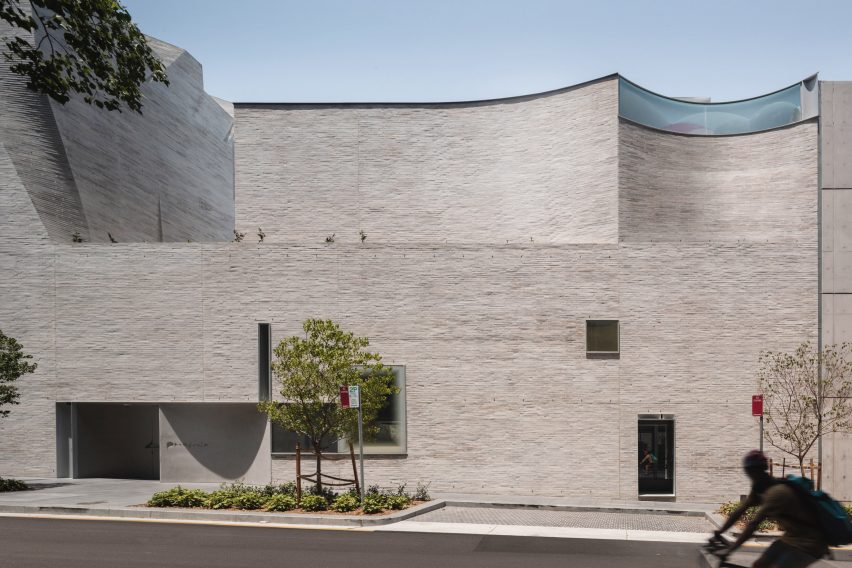
"The facade was the result of equals involved in the back-and-forth serious play of architecture," Durbach Block Jaggers co-founders Camilla Block and Neil Durbach told Dezeen.
"Phoenix Central Park is an essay in the collaborative process," added John Wardle Architects founder John Wardle.
"Our two practices came together, frequently with the client in the room and discussed strategies that were both at variance to and orchestration of both practices and the interior strategies that were being employed."
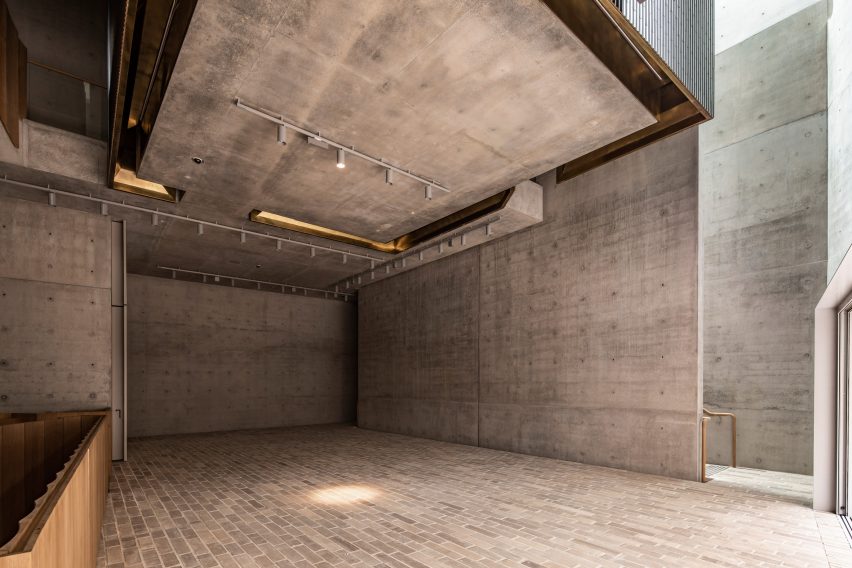
The cultural venue was commissioned by Australian billionaire Judith Neilson as a place to bring together the visual and performing arts.
"One of the intrigues of this commission was the lack of any specific detail given by our client Judith Neilson, she was intent on the brief being as open-ended as possible," explained Wardle.
"This a private gallery space that would at times address public programs, this fuelled the idea of spaces that would contain single works and an audience of one."
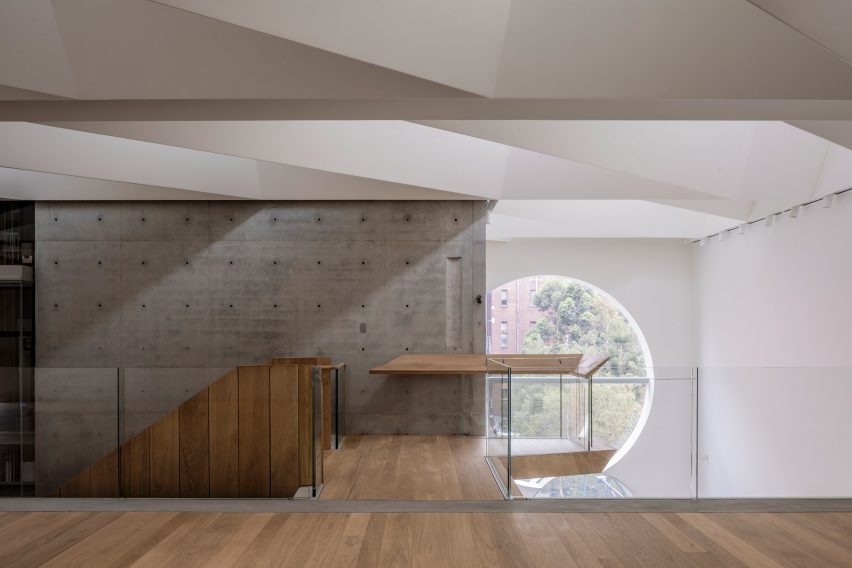
To execute this concept, the gallery volume contains a mix of rooms, with some designed to display a single piece of art in isolation next to spaces large enough to house whole collections.
Concrete floors, cast "painstakingly" in situ, are connected by a timber staircase with ridges that echo the puckered brickwork of the facade.
"The basement, ground and upper levels are all cast-in-situ concrete, the degree of difficulty was extraordinarily high as the footprint of this building is on a tight inner urban site," explained Wardle.
"The galleries were shaped out of hard walls of solid concrete and soft walls of plaster with deep background for fixing artwork," he added. "We developed a hanging system that utilizes tie rods holes used in the construction of the precast."
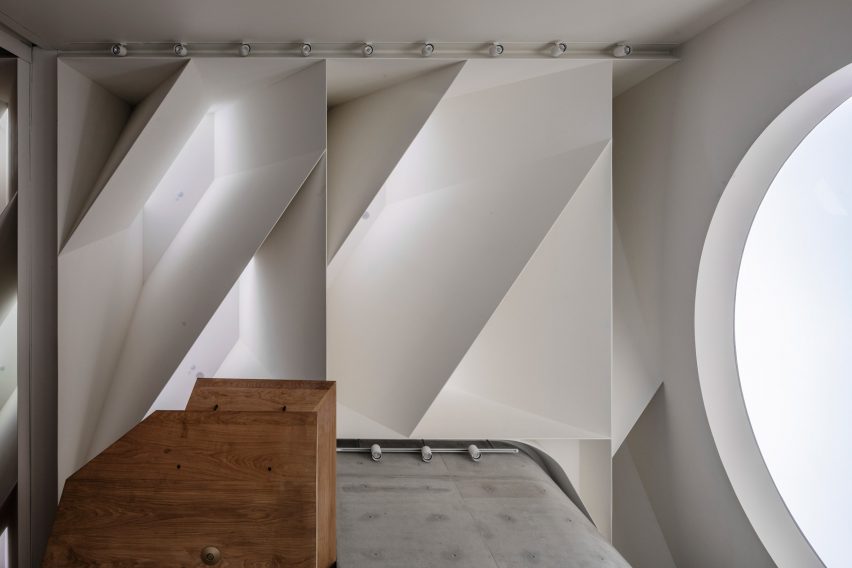
Skylights allow softly diffuse life to permeate the upper galleries, while the floor below is left atmospherically gloomy.
Another oculus forms a focal point on the exterior wall, with the brickwork dimpling around the circular window and its smaller, slightly offset, twin.
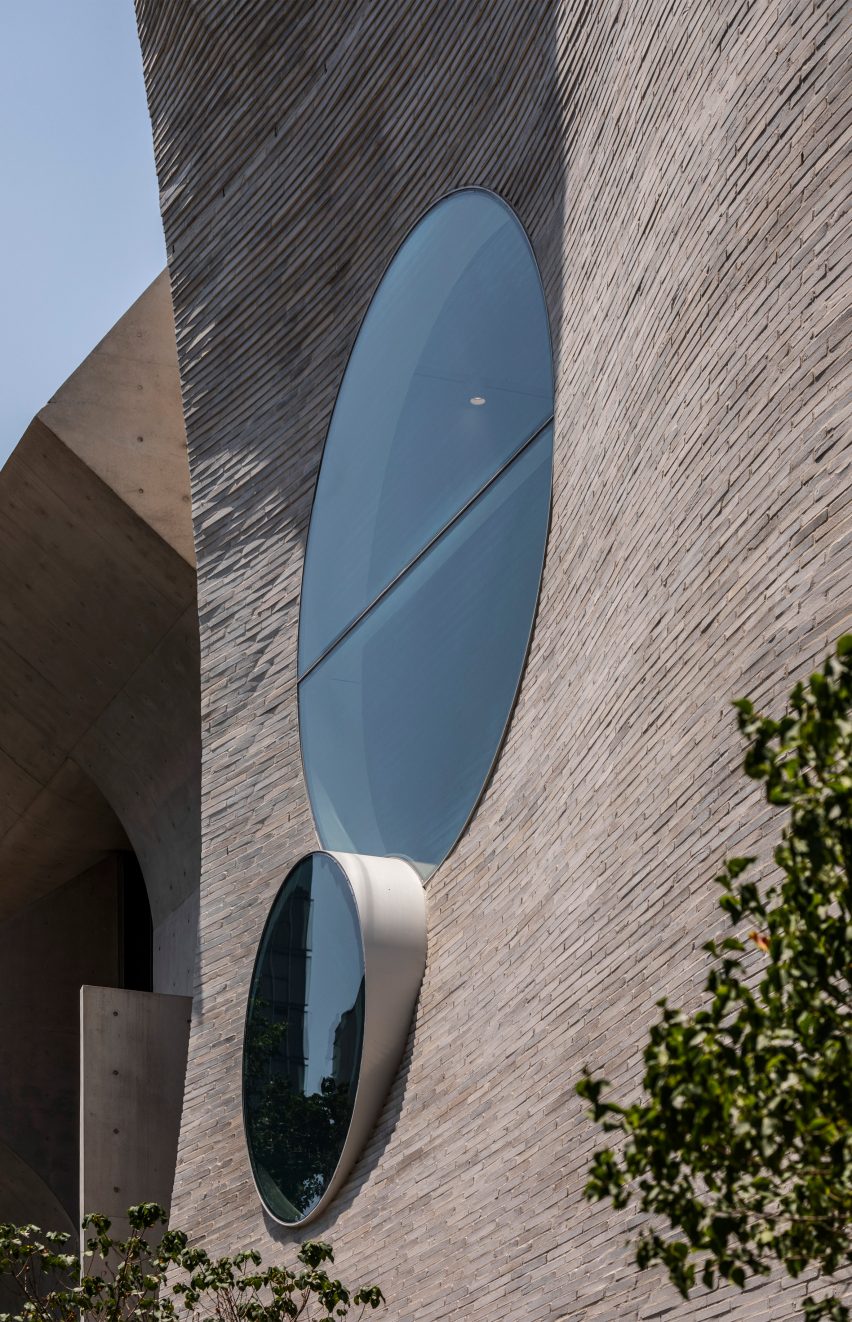
This unique feature is designed to draw attention from passersby while reminding gallery visitors of the world outside its walls, said the architect.
"We were interested in using brick as a complete surface, as a fabric-like drape that abstracted and approximated the structural characteristics of the internal elements," said Wardle.
"The vast dimple suggests the weight of the two interlocking windows impressing upon the fabric of the brick surface."
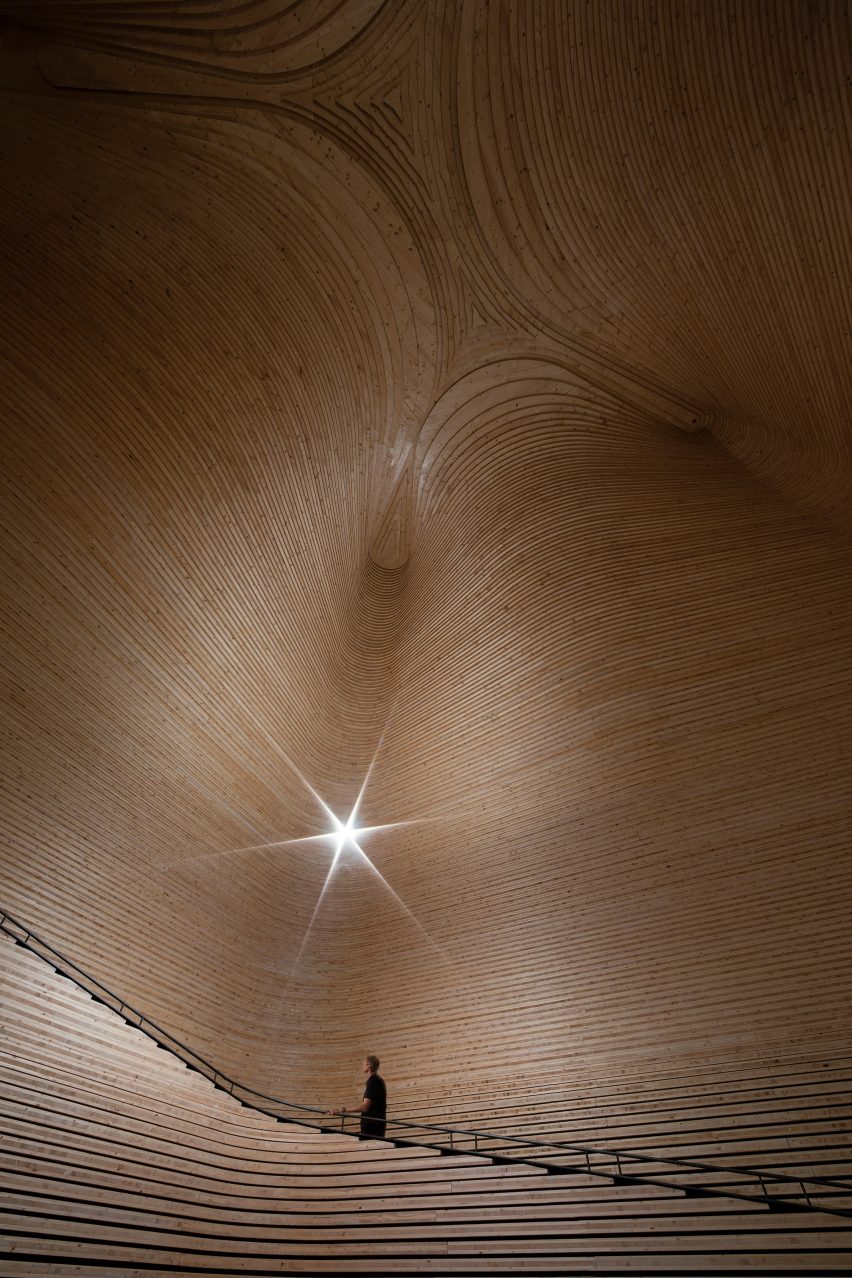
This sense of drama continues inside the performance venue, where Durbach Block Jaggers chose a layout informed by Elizabethan-era theatres.
The stage is designed to be seen in the round, so a balcony area of seating loops around the perimeter of the curving walls.
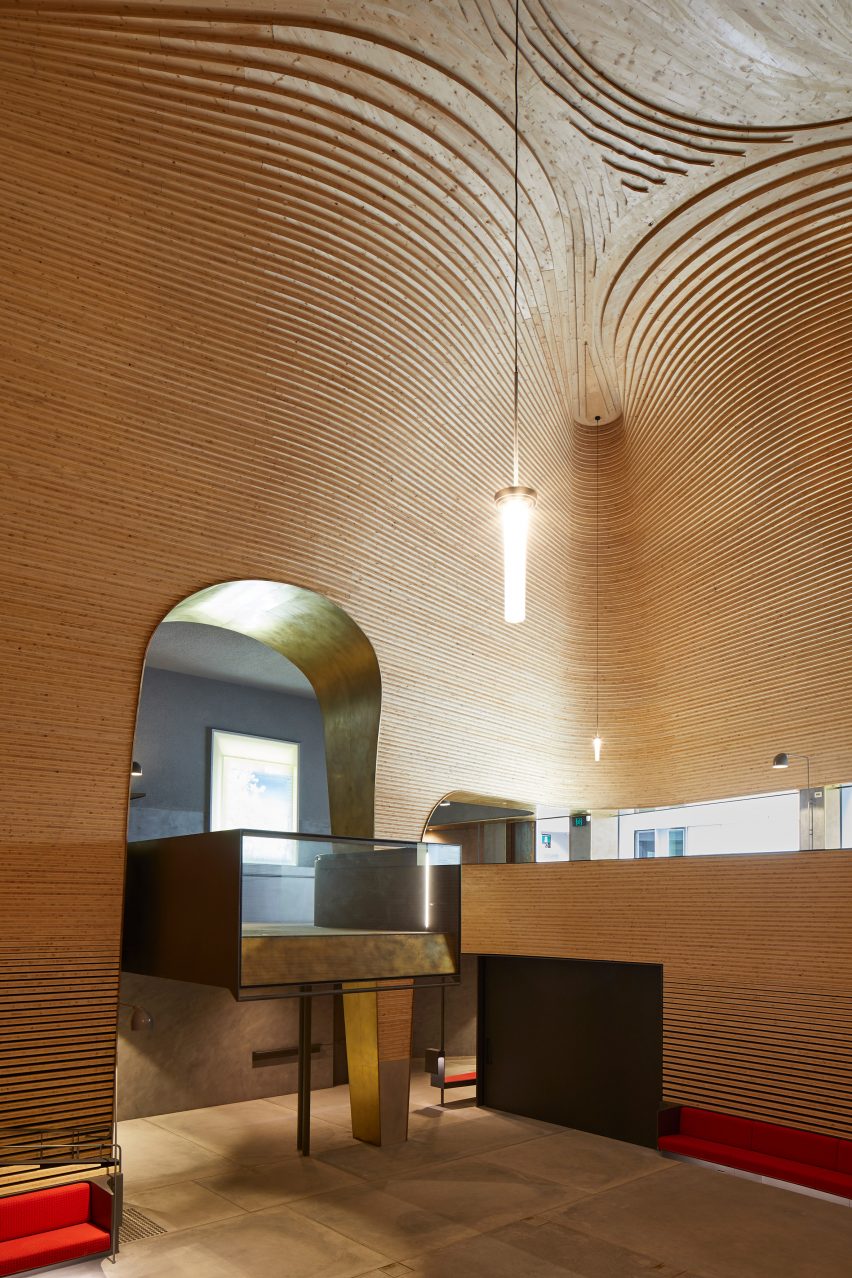
"The performance space is a billowing timber bell-shaped room, a carved 'clearing' that sits within a mute and enigmatic facade," said Block and Durbach.
"Crossing the threshold is an unexpected leap from the ordinary to a secret space of held peace."
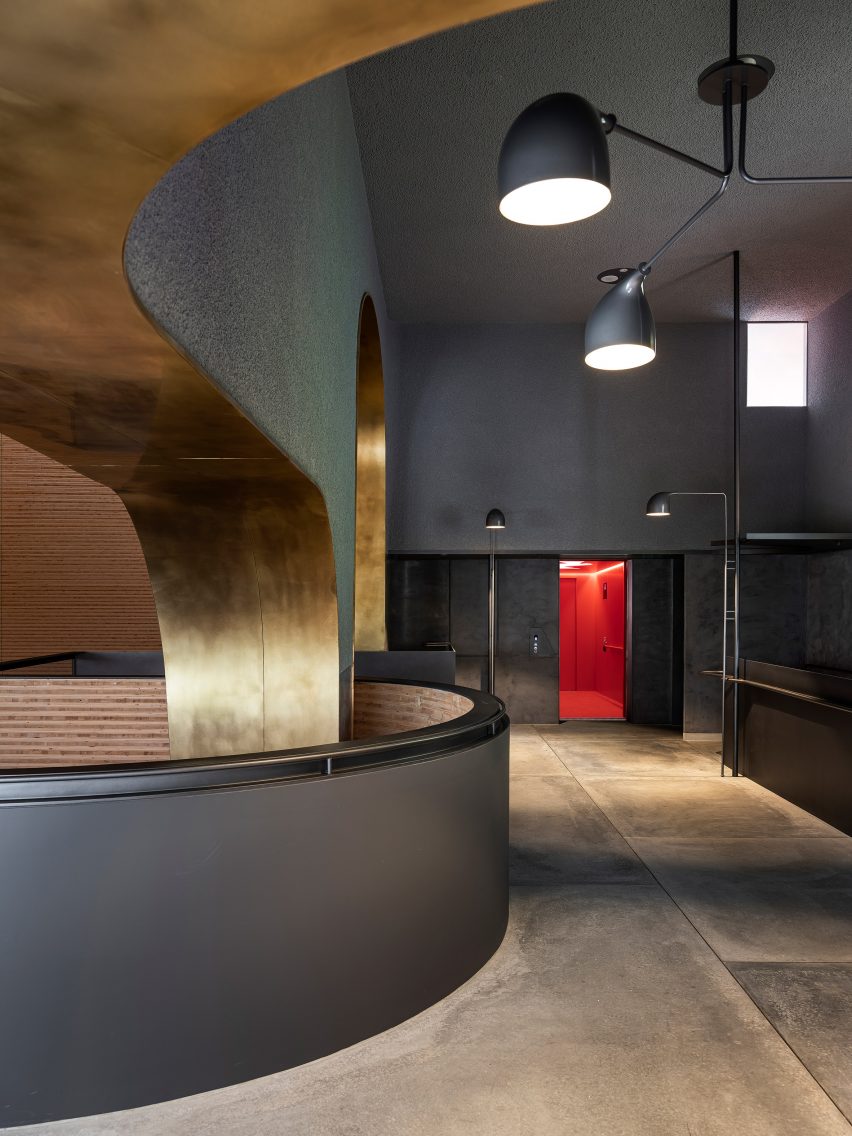
The pale timber ribs provide a striking, tactile backdrop that serves an acoustic as well as aesthetic function. These timber elements were prefabricated in a factory and assembled on site.
Outside the theatre, the lobbies are dark and moody, punctuated by gold-lined arches and striking all-red lifts that spill blood-coloured light when the doors open.
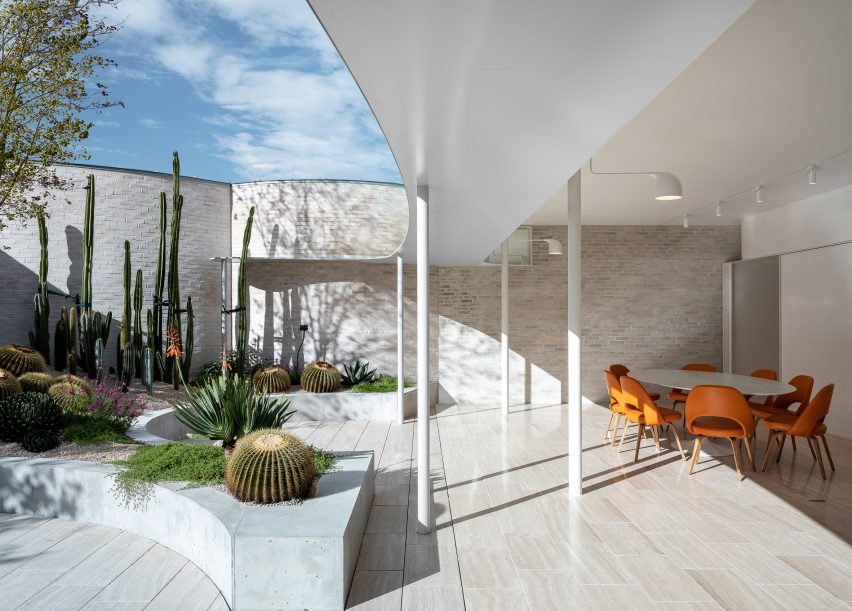
Planters in the courtyard garden have similar irregular outlines that echo the asymmetrical walls of the venue. The planters' thick rims double as benches, and inside hardy succulents and cacti are planted in a gravelly surface.
Phoenix Central Park has been longlisted for Dezeen Awards 2020.
John Wardle Architects was founded in 1986 by John Wardle and has offices in Melbourne and Sydney. Wardle won the Australian Institute of Architects Gold Medal earlier this year.
Founded by Neil Durbach, Camilia Block and David Jaggers, Durbach Block Jaggers is based in the city of Potts Point. A previous residential project by the studio is this clifftop house that was inspired by a Picasso painting.
Photography is by Trevor Mein unless otherwise stated.
Project credits:
Architects: Durbach Block Jaggers and John Wardle Architects.
John Wardle Architects team: John Wardle, Stefan Mee, Diego Bekinschtein, Alex Peck, Luca Vezzosi, Adrian Bonaventura, David Ha, Ellen Chen, Andy Wong, Manuel Canestrini, Meron Tierney
Durbach Block Jaggers team: Neil Durbach Camilla Block, David Jaggers, Simon Stead, Anne Kristin Risnes, Deb Hodge, Xiaoxiao Cai, Adam Hoh
Project manager: Aver, Colliers
Planner: Mersonn
Structural
Engineer: TTW
Civil engineer: TTW
Geotechnical engineer: Pells Sullivan Meylink
Building services engineer: Evolved Engineering
Traffic and pedestrian modelling: GTA Consultants
Fire engineer: Affinity Fire
Acoustic consultant: Marshall Day
Landscape Architect: 360º
Signage and wayfinding: Studio Ongarato
Building surveyor: Philip Chun & Associates
Accessibility consultant: Philip Chun & Associates
Facade engineers: Inhabit
Lighting design: Bluebottle
Custom bricks: Krause Bricks
Bricklaying: Favetti bricklaying
Architectural steelwork and art hanging doors: TILT; All styled, Active Metal
Off form concrete: Hi-Form
Gallery roof: ARC roofing with ARMA
Timber source: Dinesen
Timber and joinery: Top Knot Carpentry and Joinery
GRP
Ceilings: Shapeshell with DDI
Stone seat: Sourced from Hendersons Quarry in Harcourt and worked by Studio 2
CLT performance space ceiling: Hess Specialty
Render: CoverUp Dynamics
Brass basins: Bespoke House
Brass linings: Bronzeworks
Tiling: Nash
Joinery: Debrich
Commercial kitchen: Austmont
Speciality glass: Ozsea; Definitive Glass
Emergencies and exits: Bluelab Design, Australian distributor of ETAP Lighting
Brass DBJ hardware: Chant
Hardware: Keeler
Joinery and upholstery: Infracraft
Contractor: Bellevarde Construction; FDC Group